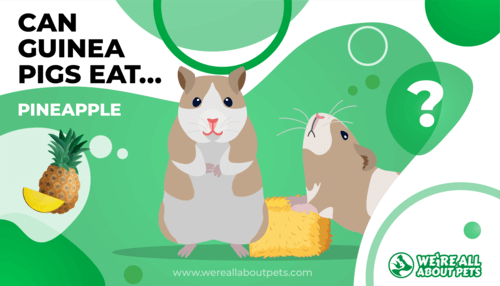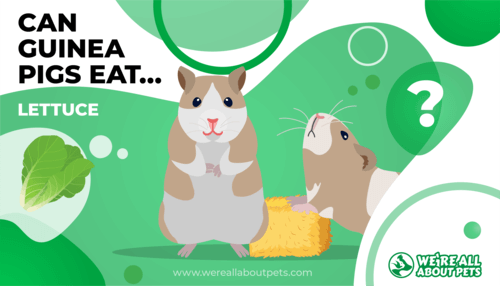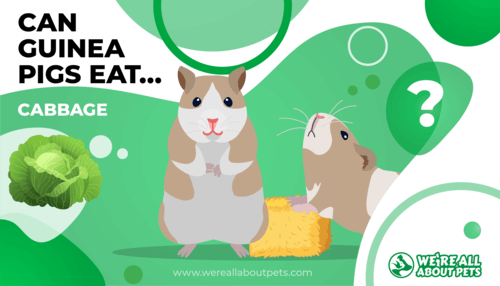Can Guinea Pigs Eat Peaches?
This page contains affiliate links. We may earn money or products from the companies mentioned in this post through our independently chosen links, which earn us a commission. Learn More
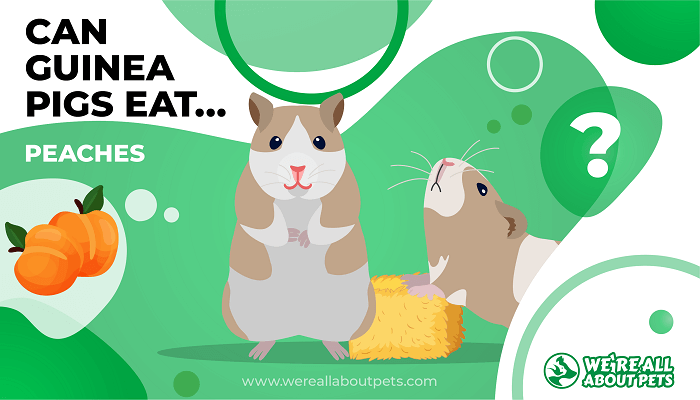
Peaches are delicious, juicy, and refreshing – they’re yummy all by themselves, and they’re fantastic in all kinds of desserts!
If you’ve got fresh peaches ready to enjoy, you’re probably wondering if they’re a good treat for your cavy.
In case you’re looking for a quick answer, here it is: Yes, guinea pigs can have peaches!
But there are definite limits to the amount you can give them as well as how often they can have this yummy treat, since too much peach can cause problems for cavies.
Keep reading for the full scoop. We’re about to tell you everything we know about peaches for guinea pigs.
Peaches Nutrition Stats
Even though a big, fresh peach is a sweet treat, you can enjoy it for under 100 calories and get some essential nutrients, while you’re at it!
One large ripe peach gives you approximately:
- 3 calories
- 3 g carbohydrates
- 6 g fiber
- 6 g protein
- .4 g fat
Peach Nutritional Facts
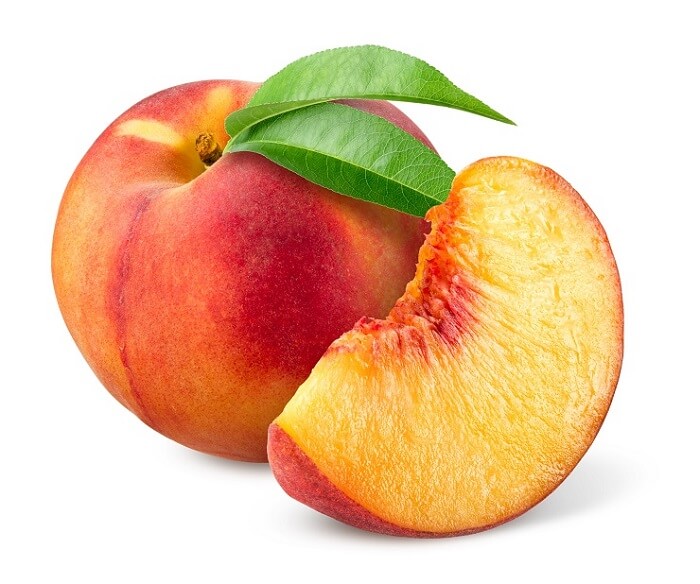
Even though peaches are bright yellow to orange in color, they’re not as high in vitamins A and C as you might think. Still, they’re a good source of many different vitamins, minerals, and antioxidants to help keep you feeling your best.
That same ripe, large peach gives you approximately:
- 570 iu vitamin A
- 333 mg potassium
- 6 mg vitamin C
- 7 mcg folate
- .1 mg manganese
- 7 mg magnesium
- .3 mg pantothenic acid
- .1 mg copper
- 5 mg calcium
- .4 mg iron
- 6 mcg vitamin K
- 35 mg phosphorus
Can Guinea Pigs Have Peaches?
Yes! Even though guinea pigs can’t have lots of peach at once and although this is a treat they can enjoy only occasionally, it’s OK to share your peach with your guinea pig.
Just be sure not to overdo it.
Are Peaches Good For Guinea Pigs?
Yes and no. On one hand, there are lots of vitamins, minerals, and antioxidants in peaches, and even though your guinea pig’s food has all they need, it doesn’t hurt to supplement.
On the other hand, peaches have a lot of sugar – and your guinea pig’s digestive tract simply isn’t set up to handle much sugar at all. Too many sweet treats can lead to complications including obesity and diabetes, leaving your piggie unhealthy, uncomfortable, and with a shorter life span.
When it comes to peaches for guinea pigs, it’s really important for us pet parents to stick to the right amount.
Do Guinea Pigs Like Peaches?
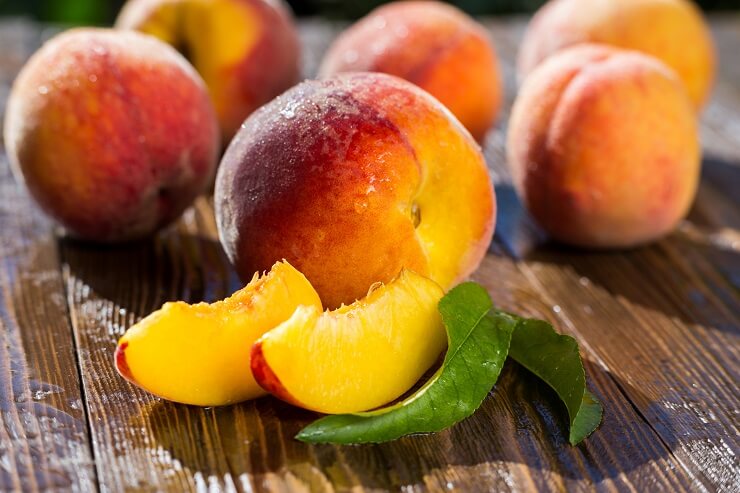
Almost all guinea pigs love peaches! Just like other sweet fruits, peaches might make your cavy squeak in appreciation!
How Much Peach Can A Guinea Pig Eat?
Cavies everywhere hope they can feast on peaches. But we’re about to rain on their parade. Here’s how much peaches to feed your guinea pig:
| Age | Amount |
| Baby guinea pig | None |
| Adult guinea pig | 1 tablespoon (about 1 thin slice of fresh peach) |
That’s not much at all, is it? Think of it this way: In relation to your guinea pig’s size, a slice of peach is about the same as a big slice of watermelon is for you.
It’s actually a pretty nice treat!
Just like every other new food you offer your piggie, fresh peaches need to be gradually introduced over time. This means giving your guinea pig just a little taste and gradually increasing the amount of peach you’re giving your cavy.
Be sure to keep an eye on your pet for several hours after they’ve had peach. If you notice bloating, signs of discomfort, or diarrhea, then your guinea pig’s digestive system might not be able to handle peaches and you should go back to their regular diet of fresh hay, veggies, and guinea pig food for a while.
How Often Can A Guinea Pig Eat Peaches?
Peaches are relatively high in sugar, and they contain quite a bit of water. This combination is fine for us humans, but it can spell trouble for your guinea pig if enjoyed too often.
Also, peaches are a bit acidic. If your guinea pig eats too many acidic foods, they could develop painful mouth sores.
After you’ve gradually introduced your guinea pig to peaches, you should make this treat a rare one. A slice pf peach every week or two is plenty. Be sure that you don’t give your guinea pig peaches on the same day that you offer other sweet treats.
The Correct Diet Is Important
We have no doubt that a wild guinea pig would eat peaches if they had the opportunity but the truth is, that isn’t a likely scenario.
In the wild, a guinea pig’s natural diet consists of low-lying vegetation – mostly grasses and little leafy plants. It’s up to us to make sure that our guinea pigs eat a similar diet in their comfy cages! Without the proper food, cavies can become very sick.
Here’s what to feed your guinea pig every day:
Hay – give your guinea pig an unlimited amount of fresh hay. The long fibers keep your piggie’s digestion running smoothly.
Vitamin C fortified guinea pig food – check the package to see how much to feed your cavy.
Around one cup of leafy greens with crunchy veggies mixed in, split into two or three servings to last the day. Rotate veggies frequently to prevent oxalic acid and calcium from building up and forming kidney stones.
Clean, fresh water – Give your guinea pig an unlimited amount of water. Help your cavy stay healthy by rinsing and refilling their drinking bottle every day.
What Are Other Healthy Alternatives To Peaches In A Guinea Pig’s Diet?

Guinea pigs can eat lots of different vegetables and fruits, so your options are nearly endless!
To help you get started, here’s a list of some veggies guinea pigs usually like:
- buttercrunch lettuce
- bibb lettuce
- escarole
- rocket
- spinach
- green beans
- artichoke
- swiss chard
- cabbage
- parsley
- basil
- beets
- beet tops
- cilantro
- carrot
- carrot tops
- romaine
- mint
- arugula
- sweet potato
- butter lettuce
- cucumber
- bell pepper
- endive
- parsnip
- zucchini
- summer squash
- pumpkin
- tomato
- bok choy
- asparagus
- yu choy
- broccolini
- broccoli
- brussels sprouts
- watercress
Your guinea pig probably likes many of the same vegetables and fruits you do – in fact, the list above is just a starting point.
We’ve got one final (very important!) piece of advice to share with you:
Whenever you plan to give your guinea pig new vegetables, fruits, or herbs, do some research. Spending just a few minutes reading up will let you know whether the item is safe or not, plus you’ll find out how much to feed your guinea pig.
For now, how about some peach? It’s a special treat that your pet can’t have all that often but every once in a while, giving your guinea pig peaches is a great way to show affection and make their day a bit brighter!
Frequently Asked Questions
Are peaches safe for guinea pigs?
Yes, but be sure to offer only the recommended amount.
Can peaches make my guinea pig sick?
Yes –sweet foods including peaches can cause diarrhea in guinea pigs. Feeding too much sweet fruit too often can also put your cavy at risk of diabetes and obesity, two conditions that are very hard for guinea pigs to live with. Tiny amounts are safest.
Can guinea pigs eat peach pits?
No! Peach pits aren’t safe for guinea pigs. They’re too hard for a piggie to handle and the inner portion of the pit contains a small amount of cyanide. Never give peach pits to a guinea pig.
Can guinea pigs eat frozen peaches?
No, unfortunately most frozen peaches have been slightly cooked before freezing plus many have added sugar or preservatives to prevent discoloration. None of this is good for your cavy. Frozen peaches are fine for you but they aren’t a good choice for your guinea pig.
Can guinea pigs have peach pie filling?
Absolutely not! Peach pie filling is delicious but it could really harm your guinea pig. Pie filling has added starch, sugar or artificial sweetener, and other additives that your pet can’t digest. The peaches in pie filling are pre-cooked, meaning your guinea pig can’t safely digest them.






